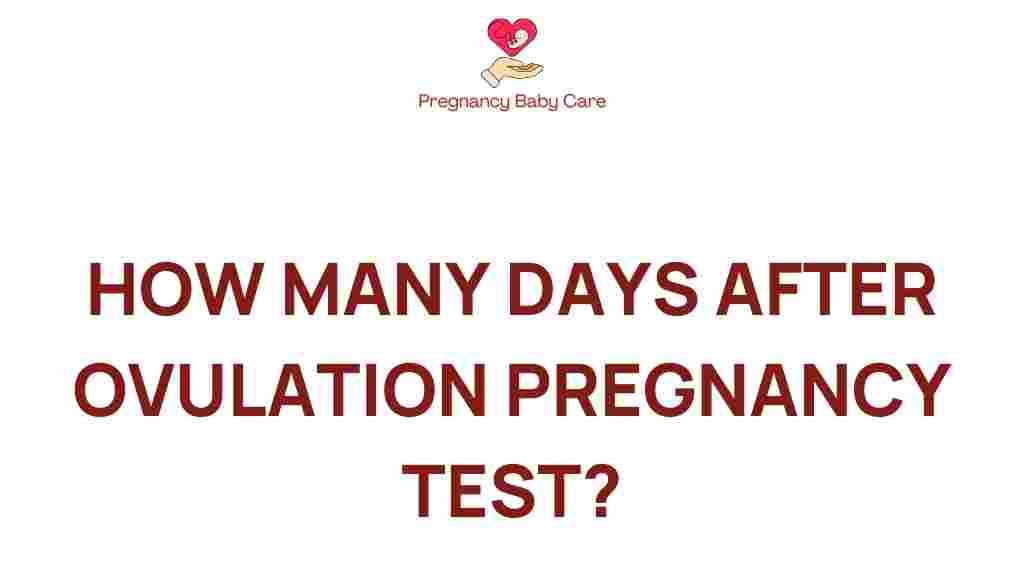Unlocking the Mystery: When to Take a Pregnancy Test After Ovulation
Understanding the intricate relationship between ovulation, conception, and the timing of pregnancy tests can be a daunting task for many. If you’re trying to conceive or just curious about your menstrual cycle, knowing when to take a pregnancy test is crucial. In this article, we will explore the timing for taking a pregnancy test after ovulation, the signs of pregnancy to look out for, and how hormone levels play a significant role in fertility.
Understanding Ovulation and Its Role in Conception
Ovulation is a key event in the menstrual cycle, marking the release of an egg from the ovaries. This process is essential for conception to take place. Here’s what you need to know about ovulation:
- Timing: Ovulation typically occurs around 14 days before the start of your next menstrual period, though this can vary based on individual cycles.
- Fertility Window: The fertile window spans 5 days before ovulation and the day of ovulation itself. Sperm can survive in the female reproductive tract for up to 5 days, making this time crucial for conception.
- Signs of Ovulation: Women may experience signs such as increased cervical mucus, mild cramping, or changes in basal body temperature.
When to Take a Pregnancy Test After Ovulation?
After ovulation, the timing of when to take a pregnancy test is vital. The general recommendation is to wait until at least one week after ovulation for the most accurate results. Here’s a step-by-step guide:
- Step 1: Identify Ovulation – Track your menstrual cycle, noting when ovulation occurs. If your cycle is regular, ovulation usually happens about halfway through your cycle.
- Step 2: Wait for Implantation – After ovulation, if fertilization occurs, the fertilized egg will travel to the uterus and implant itself about 6-10 days post-ovulation.
- Step 3: Monitor Hormone Levels – After implantation, the body begins to produce the hormone hCG (human chorionic gonadotropin). This hormone is what pregnancy tests detect.
- Step 4: Test Timing – For the highest accuracy, wait at least 14 days after ovulation to take a pregnancy test. This timing allows hCG levels to rise sufficiently for detection.
Types of Pregnancy Tests
There are two main types of pregnancy tests you can use:
- Home Pregnancy Tests: These are widely available and can detect hCG in urine. They vary in sensitivity, so check the packaging for details on when to test.
- Blood Tests: Conducted in a healthcare setting, blood tests can detect lower levels of hCG and can provide results earlier than home tests.
Signs of Pregnancy to Look Out For
In addition to taking a pregnancy test, be aware of physical signs of pregnancy that may occur after ovulation:
- Missed Period: One of the most common early signs of pregnancy.
- Breast Changes: Tenderness or swelling may occur due to hormonal changes.
- Fatigue: Increased tiredness can be an early indicator.
- Nausea: Commonly known as morning sickness, this can begin a few weeks after conception.
Factors Influencing Hormone Levels
Several factors can influence hormone levels, affecting the timing and accuracy of your pregnancy test results:
- Cycle Length: Women with irregular cycles may find it harder to pinpoint ovulation and, consequently, the best time to test.
- Medications: Certain medications can affect hormone levels, potentially skewing test results.
- Health Conditions: Conditions like polycystic ovary syndrome (PCOS) can complicate ovulation and hormone levels.
Troubleshooting: What If Your Test Is Negative?
If you receive a negative pregnancy test result but still suspect you might be pregnant, consider the following:
- Retest After a Few Days: Hormone levels may rise after a few days, so retest if your period doesn’t start.
- Check Test Instructions: Ensure you followed the test instructions accurately for the best results.
- Consult a Healthcare Professional: If you continue to have doubts, a blood test is more sensitive and may provide clarity.
Conclusion
Understanding when to take a pregnancy test after ovulation is crucial for anyone trying to conceive. By tracking your menstrual cycle and recognizing the signs of ovulation, you can improve your chances of conception and ensure accurate testing. Remember, if you suspect pregnancy, allow sufficient time for hormone levels to rise before taking a test for the best results.
For more resources on fertility and menstrual health, check out this helpful guide. Knowledge is power, and being informed about your body can lead to better reproductive health.
As you navigate your fertility journey, stay patient and informed. With the right timing and understanding, you can unlock the mystery of conception, making way for new beginnings.
This article is in the category Pregnancy and created by PregnancyBabyCare Team
